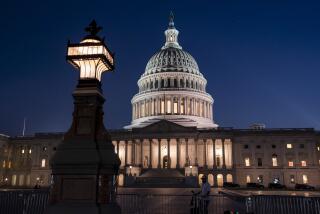President’s Banking Bill Passes Test in Key Subcommittee
- Share via
WASHINGTON — The Administration won a major victory Thursday in its campaign to rewrite the nation’s antiquated banking laws as a key House subcommittee approved the Bush plan largely unchanged.
The reform package still faces significant legislative hurdles, but the 36-0 vote indicated surprisingly strong congressional support for the first fundamental restructuring of the banking industry since the Great Depression.
“We are very pleased with the subcommittee bill,” said Assistant Treasury Secretary Jay Powell, who has been shepherding the Administration’s banking reform package through Congress. “It is very close to our own original bill.”
In fact, the reform package passed by the House Banking, Finance and Urban Affairs subcommittee on financial institutions includes provisions that could dramatically alter the landscape of America’s financial services industries.
It would abolish longstanding barriers that have prevented banks from entering many financial markets, giving them new powers to compete head-to-head with brokerage houses and other firms that have eliminated the monopoly that commercial banks once held over the savings of millions of Americans.
To its detractors, however, the legislation threatens a massive consolidation in the industry that will crush small-town bankers in favor of the big-city institutions that have been responsible for many of the lending mistakes that led to the current banking crisis.
For the first time, it would allow full interstate branch banking, give banks the power to sell and underwrite stocks and other securities and permit an infusion of investment capital into the industry by allowing the merging of commercial and industrial companies with banking firms.
The House panel approved many of those measures after dealing the Bush plan some early defeats, including rejecting new limits the White House wants to place on the federal deposit insurance that covers millions of bank accounts.
Still, the panel approved major sections of the Bush plan, despite intense lobbying from other financial services industries, which might face new competition from commercial banks if they are given additional powers.
Discount brokerage firms reportedly asked many of their small-town brokers to call their congressional representatives in an effort to stave off a vote in favor of giving banks the right to sell stocks.
The panel also approved an unprecedented plan to give the Federal Deposit Insurance Corp. the right to borrow $25 billion from the Treasury to replenish the insurance fund that backs up bank deposits to a limit of $100,000 per account.
To date, the deposit insurance fund has been financed by premiums paid by banks. The new law would require banks to pay back whatever is borrowed from the Treasury--although many critics argue that banks probably would not be forced to repay the government fully.
Still, federal banking regulators have warned that the government has little choice but to back up its guarantees of bank deposits with billions in taxpayer money. L. William Seidman, chairman of the FDIC, has said the deposit insurance fund will be insolvent by the end of the year as a result of the country’s more than 1,200 bank failures during the past five years.
But the House panel defeated Administration-backed efforts to place modest limits on the $100,000 in deposit insurance guaranteed each account.
The White House had wanted to limit insurance to $100,000 for each depositor in each bank, with an additional $100,000 available for retirement accounts. Currently, federal insurance covers multiple accounts up to $100,000 in each bank.
Many of the provisions approved by the subcommittee will face new battles as the full 52-member House Banking Committee--which takes up the bill in June--and the House Energy and Commerce Committee consider the legislation. The latter panel’s powerful chairman, Rep. John Dingell (D.-Mich.), has vowed to intervene to defeat efforts to let commercial firms merge with banks.
In addition, a last-minute vote by the subcommittee to relax rules requiring banks to lend more money to the poor and to small businesses in their communities may also be reversed by the full Banking Committee. Also, the Bush Administration plans to work hard to reverse its earlier defeat and impose new limits on deposit insurance coverage.
The Senate, meanwhile, has not taken up its banking legislation.
More to Read
Get the L.A. Times Politics newsletter
Deeply reported insights into legislation, politics and policy from Sacramento, Washington and beyond. In your inbox twice per week.
You may occasionally receive promotional content from the Los Angeles Times.










